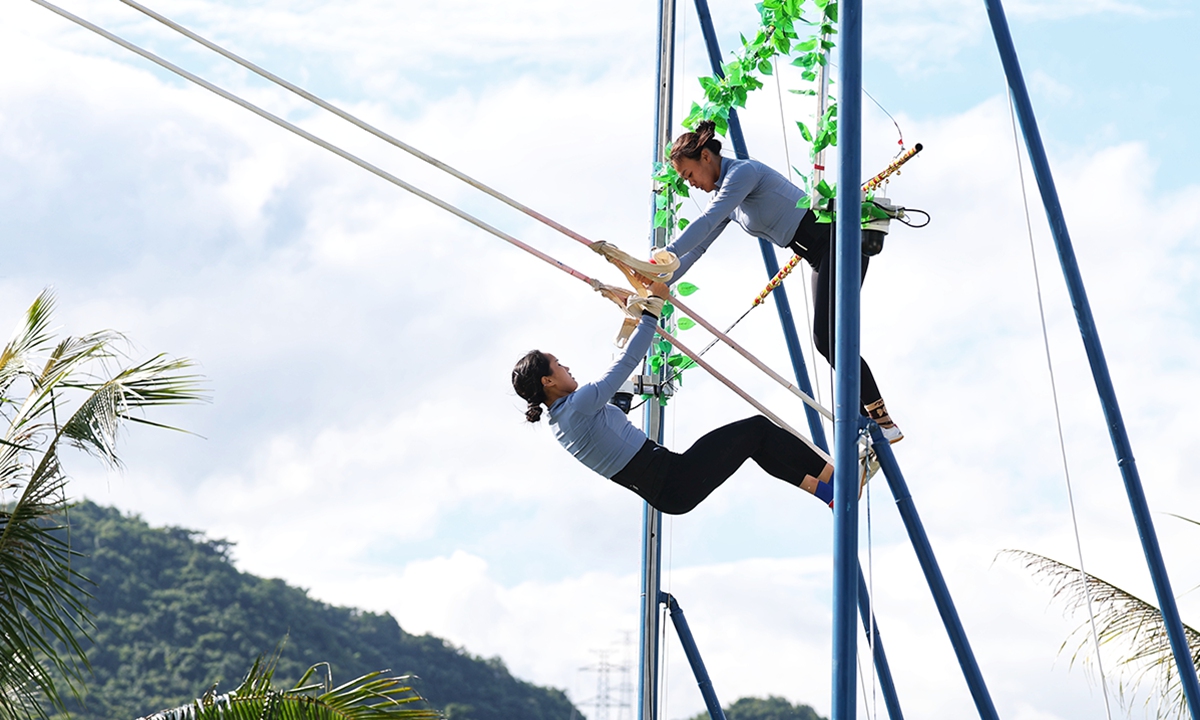ARTS / CULTURE & LEISURE
Swing competition highlights tradition, athleticism at National Traditional Games of Ethnic Minorities

Photo: Cui Meng/GT
Swing as a sports competition may surprise many. At the National Traditional Games of Ethnic Minorities in Sanya, South China’s Hainan Province, over 60 athletes are competing for top honors in their respective categories.Athletes aim to reach the highest swing or the most bell touches with minimal preliminary swings. Only female athletes are allowed to compete.
The competition is divided into two weight categories: 55 kg and below, as well as above 55 kg. The events are further categorized into height-based competitions and bell-touching contests, featuring both single and pair formats.
On the opening day of the competition on Saturday, Chongqing pair Wang Rong and Ma Qijin secured first place in the above 55kg category with 87 bell touches, after Hunan pair Fei Qianhong and Wu Anzhen won the 55kg category in 87 bell touches.
It is the Wang/Ma pair’s second consecutive win at the National Traditional Games of Ethnic Minorities.
“We hoped to achieve more but it’s not a perfect day due to the wind,” Wang told the Global Times, before noting the duo's composure played a significant role in their victory.
“After years of competition experience our mindset was steadier, allowing us to perform at a higher level during the competition,” Wang said.
For the Hunan pair who secured first place, they underlined adaptability as the key to their success.
"Through different competitions, we've learned to adjust to varying conditions like the changes in wind,” Wu told the Global Times. “This adaptability has helped us progress further over time in swing competitions.”
The swing competition in China typically is held in a rectangular area, measuring 20 by 8 meters, with a clearance of 15 meters above the ground.
The swing debuted as a demonstration sport at the second National Traditional Games of Ethnic Minorities in 1982 and subsequently became an official competitive event in the third edition in 1986.
The swing has long been a traditional activity in Northeast, Central, South, and Southwest China, rooted in a rich historical tradition. Notably, during the reign of Emperor Wu of the Han Dynasty (206BC-AD220), swings were a prominent pastime in the royal palace.
In 2006, the swing was recognized as part of the first batch of National Intangible Cultural Heritage representative items in China.
Separately on Saturday, the Guizhou dragon boat team secured the men’s 24-person dragon boat 1,000-meter straight race with 3:53.29 minutes, the first prize following the opening ceremony.
Compared to the conventional National Games, the National Traditional Games of Ethnic Minorities focus more on cultural celebration than competition, as awards for the lead finishers are listed as first, second and third prize rather than being given instead of gold, silver, and bronze medals.
